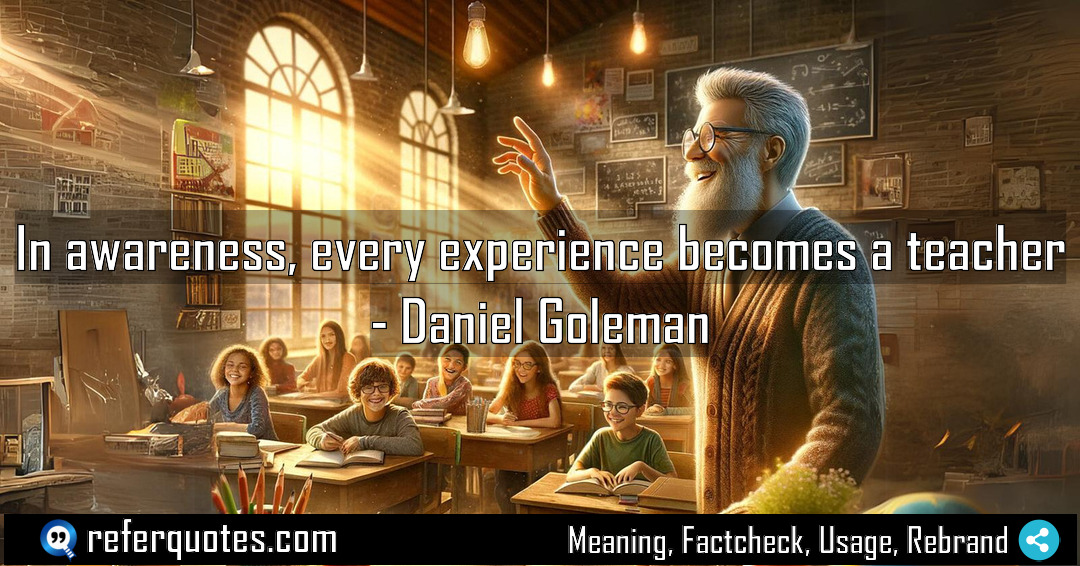When Daniel Goleman says “In awareness, every experience becomes a teacher,” he’s pointing to a profound shift in how we engage with life. It’s about moving from being on autopilot to becoming an active, curious learner in every single moment. This simple change can completely transform your relationship with your thoughts, your feelings, and the world around you.
Share Image Quote:Table of Contents
Meaning
At its heart, this quote means that the simple act of paying attention—*real*, non-judgmental attention—unlocks the hidden curriculum in everything that happens to you. The lesson isn’t in the event itself, but in your conscious relationship to it.
Explanation
Let me break this down because it’s a game-changer. Most of us, we live reactively. Something happens—a tough conversation, a traffic jam, a moment of joy—and we just react. We get angry, we get stressed, we move on. We’re basically on a treadmill of stimulus and response.
But awareness… awareness is the power to step off that treadmill.
When you bring awareness to an experience, you’re no longer just the actor in the drama; you’re also the audience. You observe the anger without becoming it. You notice the stress without being consumed by it. And in that space of observation, the experience starts to *teach* you. It shows you your triggers, your patterns, your deeply held beliefs. The traffic jam teaches you patience. The difficult conversation teaches you about your boundaries. The moment of joy teaches you what truly fills your cup. It’s not about positive thinking; it’s about accurate seeing. And accurate seeing is the most powerful teacher there is.
Quote Summary
| Context | Attributes |
|---|---|
| Original Language | English (3668) |
| Category | Education (260) |
| Topics | awareness (126), experience (26), learning (190) |
| Literary Style | aphoristic (181) |
| Emotion / Mood | inspiring (392) |
| Overall Quote Score | 84 (319) |
Origin & Factcheck
This gem comes straight from Daniel Goleman’s 1988 book, The Meditative Mind: The Varieties of Meditative Experience. It’s a foundational text from the United States that really helped bridge Eastern contemplative practices and Western psychology. You sometimes see this idea floating around attributed to Buddhist teachers or other mindfulness experts, and while the *concept* is ancient, this specific, elegant phrasing is Goleman’s.
Attribution Summary
| Context | Attributes |
|---|---|
| Author | Daniel Goleman (125) |
| Source Type | Book (4032) |
| Source/Book Name | The Meditative Mind: The Varieties of Meditative Experience (60) |
| Origin Timeperiod | Modern (530) |
| Original Language | English (3668) |
| Authenticity | Verified (4032) |
Author Bio
Daniel Goleman is a psychologist and bestselling author whose journalism at The New York Times brought brain and behavior science to a wide audience. He earned a BA from Amherst and a PhD in psychology from Harvard, and studied in India on a Harvard fellowship. Goleman’s research and writing helped mainstream emotional intelligence, leadership competencies, attention, and contemplative science. He co-founded CASEL and a leading research consortium on EI at work. The Daniel Goleman book list includes Emotional Intelligence, Working with Emotional Intelligence, Primal Leadership, Social Intelligence, Focus, and Altered Traits.
| Official Website
Where is this quotation located?
| Quotation | In awareness, every experience becomes a teacher |
| Book Details | Publication Year/Date: 1977 (originally as The Varieties of Meditative Experience, revised 1988 as The Meditative Mind); ISBN: 9780874778335; Last Edition: Tarcher/Putnam 1988; Number of pages: 320. |
| Where is it? | Approximate page from 1988 edition, Chapter 5: The Stages of Meditation |
